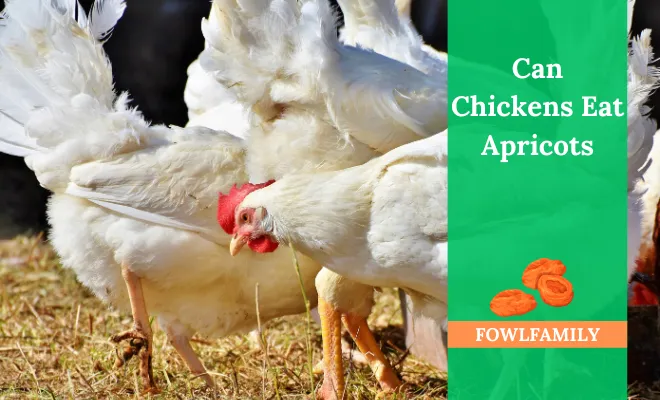Can Chickens Eat Apricots? 3 Risk Factors You Should Keep In Mind!

Despite being a peach-like fruit, Apricots are vastly rated bad for chickens. But how strong the base is? Well, I would say do not believe what you see online always.
So, can chickens eat Apricots? Certainly. But, only the flesh part is recommended as this is highly nutritious. Give Apricots as an occasional treat following an appropriate quantity and serving approach, and it won’t cause headaches. However, other Apricot parts have Cyanide in them which is toxic for ducks.
I’m not denying the fact that Apricots have risky factors. In this article, I’m gonna clear up confusion regarding feeding Apricots to chickens. So, keep on reading!
Table of Contents
Can Chickens Eat Apricots? Baby Chicks Can’t!
Chickens can eat apricots in moderation as an occasional treat. Apricots contain vitamins, minerals, antioxidants, and fiber that can provide some health benefits to chickens. However, apricots also contain sugar content that can cause weight gain or digestive issues if chickens overeat.
Overall, a few apricot pieces 2-3 times per week make a healthy supplementary snack.
How Apricots Can Be a Healthy Snack?

Apricots offer high amounts of vitamin A, vitamin C, potassium, magnesium, and beta-carotene. These are all the nutrients that are essential for chicken health and egg production.
At the same time, apricots’ high sugar content from fructose and sucrose. These can cause diarrhea, digestive upset, or obesity if consumed excessively.
In small quantities, the nutritional perks of fresh apricots outweigh any risks. But my personal suggestion is, chickens should only replace their regular feed intake with a few sweet, sugary fruits.
Can Baby Chickens Eat Apricots?
Baby chicks should not eat apricots. A baby chicken’s digestive system is too mild to digest the complex carbs and sugars properly.
Wait until chicks grow feathers and naturally start scavenging treats around the run at 4-6 weeks old before introducing any fruits.
In general, the chicks transition to layer feed when they’re 2 months and older. At this age, they can eat a thin apricot slice once a week with no issue.
What If I Feed Chickens Apricots Daily?
Feeding chickens too many apricots frequently can create trouble. Replacing their normal feed with lots of fruit will lead to poor nutrition. Their digestive systems can also get upset when overloaded with all that sweet sugar.
Over time, eating so many yummy treats every day may cause the chickens to gain too much weight.
Can Chickens Eat Apricot Skin?

Chickens can safely munch on apricot skin without worries. The thin peel provides a little fiber boost that their bodies appreciate. Simply give the apricots a gentle wash first in case of any chemicals on the skin – organic or not. The skin poses no risk of choking for the chickens.
Can Chickens Eat Apricot Pits?
No. Apricot pits contain trace cyanide compounds toxic in high amounts. Avoid feeding chickens the inner seeds. Simply offer pit-free flesh instead.
Can Chickens Eat Apricot Leaves?
If I were you, I wouldn’t. Leaves offer nutritional value but also contain cyanide compounds. A small consumption might cause no harm but why take risk?
Do Chickens Eat All Forms of Apricot?
Well, Have a look at the table below and you’ll have all your answers.
| Form of Apricot | Edibility for Chickens |
|---|---|
| Ripe apricots | Yes |
| Unripe apricots | Yes |
| Apricot juice | Yes (100% pure only) |
| Apricot jam | No (too much added sugar) |
| Dried apricots | Yes (high in natural sugars) |
| Canned apricots | Yes (may contain preservatives) |
Nutritional Profile Per 100g of Apricot
According to USDA, let’s see how nutritious an Apricot (in every 100g) is.
| Nutrient | Amount | Unit |
|---|---|---|
| Water | 86.4 | g |
| Energy | 48 | kcal |
| Energy | 201 | kJ |
| Protein | 1.4 | g |
| Total lipid (fat) | 0.39 | g |
| Ash | 0.75 | g |
| Carbohydrate | 11.1 | g |
| Fiber | 2 | g |
| Sugars | 9.24 | g |
| Sucrose | 5.87 | g |
| Glucose | 2.37 | g |
| Fructose | 0.94 | g |
3 Notable Nutritional Benefits of Apricots
Although many resources claim not to feed Apricots to your chickens, I don’t agree with it completely. Yes, certain Apricot parts are risky for chickens, but if you give them a nutritious part of Apricots, the chickens might benefit as follows:
- Apricots contain carotenoids, flavonoids, vitamins C and E along with other powerful antioxidants. Antioxidants support immune function and overall health.
- The fiber in apricots serves as a prebiotic to feed healthy gut bacteria and improve digestive efficiency.
- Apricots also come up with vitamins like vitamins A, E, and B-complex. These vitamins support feather growth and egg production as well.
As a whole, apricots provide meaningful amounts of key vitamins, minerals, fiber, and phytonutrients. The nutrient density fills important nutritional gaps in balanced chicken diets. So, by practicing necessary precautions, why on earth you can’t give Apricots to your chickens?
3 Potential Drawbacks of Overfeeding Apricots

Here comes the most crucial part. Why is it risky to feed your chickens? Well, I have already told you. Here’s an elaborate discussion for you.
1. Gastrointestinal Disruption
An excess of apricot fruit can overwhelm the digestive system of chickens. The high sugar and fiber content in abundance may irritate the gut lining and cause loose droppings or diarrhea. The chickens can fart excessively as a consequence of apricot overfeeding.
2. Weight Gain & Fatty Liver Issues
The natural sugars in apricots are calorie-dense and easily converted to fat stores. Chickens who overindulge in the sweet treat frequently may become overweight or obese over time. Excess fat deposition in the liver also causes organ strain.
3. Nutritional Imbalances & Deficiencies
When apricots become a portion of a chicken’s diet, the narrow nutrients cannot replicate a complete, balanced feed. Undereating well-rounded feed in favor of limited fruits leads to malnutrition, immuno-issues, and suboptimal health over the long term.
Proper Methods for Serving Apricots to Chickens
Well, I’ve been saying it you have to practice precautions while feeding Apricots to your chickens. I guess, you know now, a proper serving method is important here. My serving suggestions are as follows:
Step 1: Preparation
Rinse apricots thoroughly under cool, running water to remove any dirt or debris. Pat dry. You may keep the skin intact for added nutrition and fiber if preferred.
Step 2: Portioning
Slice larger apricots in half from stem to bottom. For smaller fruits, quarter into even segments. Or dice into bite-sized bits for easier sharing among the flock.
Step 3: Serving
Place apricot pieces into a communal plate or scatter directly onto the coop floor. Hand feeding works as well for closer monitoring. Offer treats in shared open spaces for equal access.
Step 4: Amount
Allow 1 thin half or 2 large slices or 4 small diced pieces per average adult chicken. Cater smaller helpings for bantams and more for larger bird breeds.
Step 5: Frequency
Serve apricot treats just 2-3 times per week at most as too much poses health risks. Keep alert for any decrease in normal feed intake or signs of loose droppings indicating excess fruit.
Related readings:
In Summary
Apricots are tricky for chickens. So I have cleared out can chickens eat Apricots or not. The main deal is to feed them in a proper serving approach. It is nutritious until given as an occasional treat and following an appropriate serving approach. Overfeeding Apricots brings several health issues.
Only the flesh part is good for chicken consumption. No stem, leaves, or pits as all of these contain cyanide which is toxic to chickens. One key acknowledgement is that no more than once a week Apricots for chickens!
Sources and References:
- https://www.researchgate.net/publication/275345898_Effects_of_dietary_supplementation_of_waste_apricot_in_Broiler_feeds_on_FCR_body_weights_and_bone_strength_of_Broiler_Ross-308_chicks
- https://www.sciencedirect.com/science/article/abs/pii/S0196064498700770
- https://pubmed.ncbi.nlm.nih.gov/20196932/






